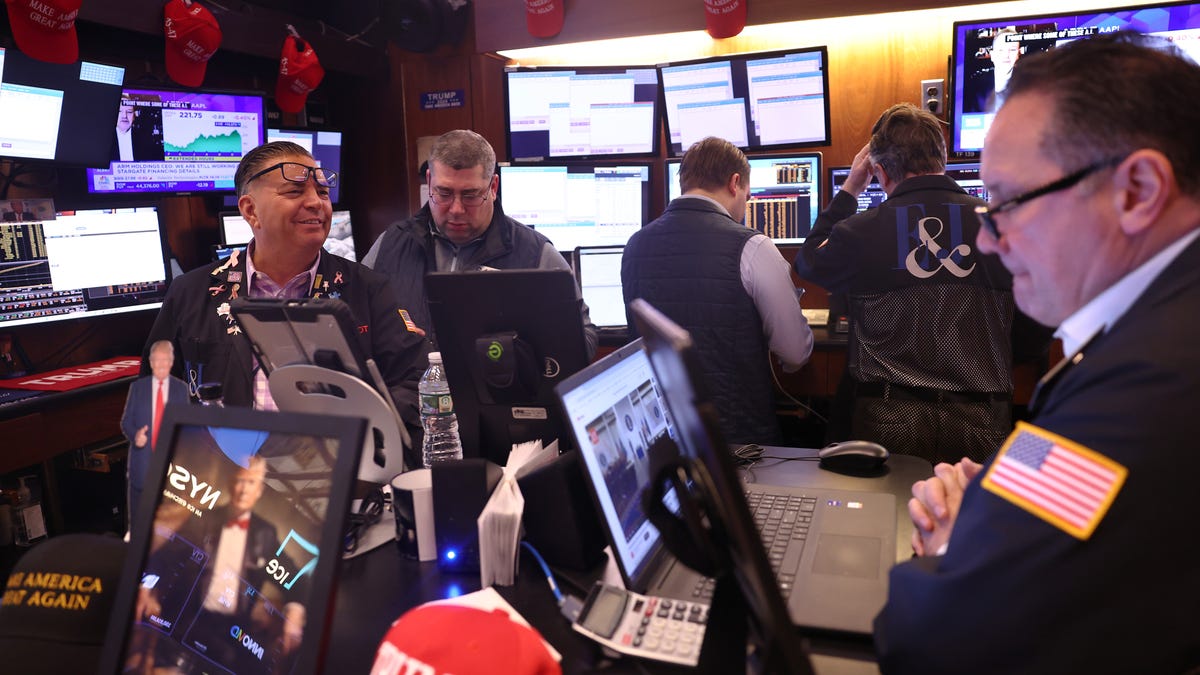
Trump admin comes to trade deal framework agreement with China
President Donald Trump and Chinese officials agree on a framework for a trade deal to include tariffs and eased rare earth restrictions.
U.S. stocks erased opening losses to close higher, buoyed by gains in technology shares.
Better-than-expected results and a positive outlook from Oracle rejuvenated artificial intelligence optimsim. It was enough to overcome losses made on renewed tariff tensions and a slump in planemaker Boeing.
The blue-chip Dow edged up 0.24%, or 101.85 points, to 42,967.62; the broad S&P 500 rose 0.38%, or 23.02 points, to 6,045.26; and the tech-heavy Nasdaq added 0.24%, or 46.61 points, to 19,662.49. The benchmark 10-year Treasury yield fell to 4.359%.
President Donald Trump raised tariff tensions again by promising unilateral tariff rates within two weeks.
Shares of jet maker Boeing also weighed on the market after another deadly crash of one of its jetliners. A Boeing 787-8 Dreamliner flown by Air India carrying 242 people crashed in the Indian city of Ahmedabad. More than 200 people reportedly are dead. Boeing shares dropped 4.41%.
Trump said he will send letters to trading partners in the next couple of weeks setting unilateral tariff rates, ahead of a July 9 deadline to reimpose higher duties on dozens of economies.
Trump’s new tariff threat contrasts with the more positive tone officials tried to strike after reaching a trade framework with China in London and earlier remarks from Treasury Secretary Scott Bessent.
Bessent said at a hearing before the House Ways and Means Committee however that the Trump administration was open to extending the current 90-day tariff pause beyond July 9 for the U.S.’s′ top trading partners, as long as they show “good faith” in ongoing trade negotiations.
Commerce Secretary Howard Lutnick said in a CNBC interview negotiations with the European Union have been tough but that the EU finally has “made a proper offer.”
He later posted on social media that new trade quotas for British autos and American beef and ethanol will take effect in the “coming days.” The U.K. and U.S. are pushing to implement their trade deal as soon as possible, he said.
More cool inflation data
Annual producer prices, or the the prices businesses pay for their goods and services, rose 2.6% in May, in line with consensus estimates. Without the volatile food and energy sectors, prices rose 3%, just cooler than expectations for 3.1%.
Some economists expect some tariff-related inflation to appear as inflation first can be seen by businesses, before price increases are passed on to consumers. However, that was not the case in May.
With producer and consumer inflation still moderating and the labor market holding up, the Federal Reserve has time to hold rates steady while it continues to watch for any tariff-fallout, economists said.
Weekly jobless claims rose by 248,000 in the week through June 7, unchanged from the previous week’s revised level and just a tad higher than the 246,000 average forecast from economists polled by The Wall Street Journal.
Oil watch
Oil prices edged up, after spiking 4% on June 11 on Mideast tensions.
The U.S. embassy in Iraq reportedly is preparing to be evacuated in response to heightened security risks in the region. The U.S. State Department announced plans to order non-essential embassy personnel and their families to leave Bahrain and Kuwait, and the British Navy issued a rare warning to ships in the region, stating it “has been made aware of increased tensions within the region that could lead to an escalation of military activity having a direct impact on mariners.”
Israel also is considering taking military action against Iran without U.S. support in the coming days, five people with knowledge of the situation told NBC News.
Though Natasha Kaneva, head of global commodities research at JP Morgan, still expects oil prices to linger in the $60 per barrel range this year, she warned in a research note that “an attack on Iran could spike oil prices to $120.”
Corporate news
- Oracle’s results in the final three months of its fiscal year topped Street views. The company also said cloud infrastructure revenue will rise by more than 70% in fiscal 2026, up from a 50% growth rate in the prior fiscal year. Shares jumped 13.31%.
- GameStop plans to sell $1.75 billion of convertible notes. Shares slid 22.35%.
- CureVac agreed to be bought by BioNTech in a deal worth about $1.25 billion. CureVac shares rallied 37.59%.
(This story was updated with new information.)
Medora Lee is a money, markets, and personal finance reporter at USA TODAY. You can reach her at mjlee@usatoday.com and subscribe to our free Daily Money newsletter for personal finance tips and business news every Monday through Friday morning.









